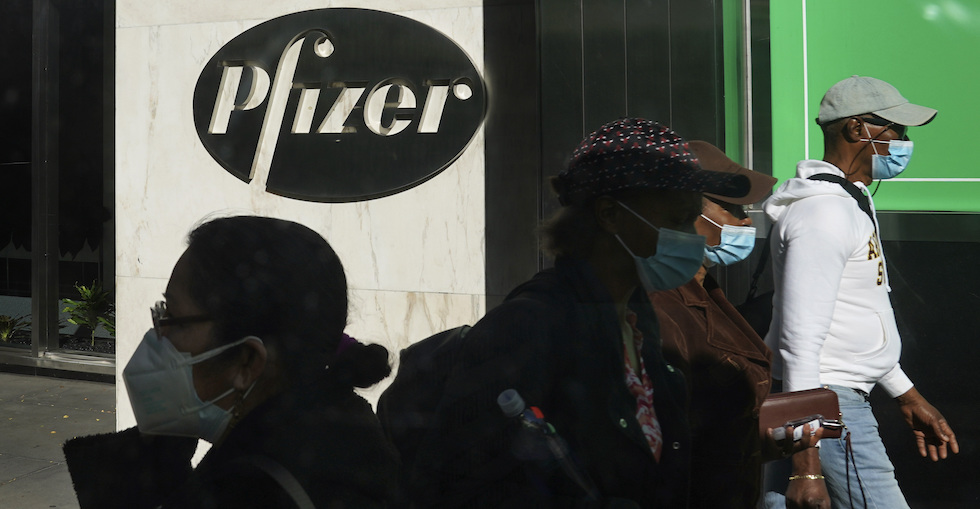
[ad_1]
The American pharmaceutical company Pfizer and the German biotechnology company BioNTech have announced that they have completed the last part (of 3) of the clinical trial dedicated to evaluating the efficacy of their vaccine against the coronavirus. Based on newly released data, the experimental vaccine is 95 percent effective, higher than the preliminary figure of 90 percent reported ten days ago in a first preliminary data set. The announcement was well received by experts and observers, although the duration of the protection offered by the vaccine remains to be clarified.
Pfizer and BioNTech have confirmed that they will soon request an emergency clearance from the Food and Drug Administration (FDA), the US federal agency that deals with drugs. The procedure makes it possible to speed up the introduction of new drugs and vaccines, for which studies and verifications are still ongoing. The two companies will also apply for similar authorizations in other areas of the world, including Europe.
The step 3 Clinical trials of the vaccine by Pfizer and BioNTech had been launched last July and then had entered full capacity with the enrollment of about 44,000 volunteers, divided into two groups: the first received the vaccine, while the second a substance that does nothing (placebo). The researchers then waited to see how many contracted a coronavirus infection and became ill, to assess the vaccine’s ability to offer protection.
Today the two companies announced that they had detected 170 cases among the volunteers (a minimum limit of 164 had been given to draw conclusions from the clinical trial): 162 occurred in the group that received the placebo and only the remaining 8 occurred among the volunteers who had received the two doses of the vaccine, 28 days apart.
Among the 170 cases, 10 were found with severe symptoms: 9 in the placebo control group and one in the vaccinated group. This finding is considered important because it seems to indicate the ability of the vaccine to prevent not only mild cases, but also those that lead to more severe symptoms and that in some circumstances can be fatal. The vaccine has also been shown to be effective in people over the age of 65, who tend to be at higher risk of developing severe symptoms.
Pfizer and BioNTech also say they found no adverse effects in the clinical trial that could cause concern: the most common were fatigue and headaches in 2 percent of the participants.
The experimental vaccine is based on messenger RNA (mRNA), the molecule that encodes and carries the instructions contained in DNA to produce proteins. Vaccines based on this system use synthetic forms of mRNA, made in the laboratory, that contain instructions for making certain specific coronavirus proteins. In this way, the immune system learns to recognize and fight them, but without the risks that it would run in the case of a real coronavirus infection. The immune system can use the knowledge gained to counteract these proteins to counteract any actual infection.
The mRNA-based technique allows for faster doses and simplifies some steps than traditional methods, but it is fairly recent and no large-scale mRNA-based vaccine has been marketed or used to date. This raises some doubts about the potential and reliability of this system, although the news that has circulated so far about the experimental vaccines that use it are quite encouraging.
In fact, Pfizer and BioNTech are not the only ones to have developed an mRNA-based vaccine. For example, the American biotech company Moderna, which just announced this week that it had found its vaccine to be 94.5 percent effective. The estimate is based on a preliminary and partial analysis of data collected during clinical trials of step 3. Moderna also plans to wrap up the trial soon and then initiate emergency clearance requests.
In recent days, Pfizer had announced that it could produce around 50 million doses by the end of the year and forecast a production of 1.3 billion vaccines by 2021. The company has already started production, in order to have doses in stock to use as soon as you receive authorization.
Unlike other vaccines, Pfizer and BioNTech’s must be stored near -70 ° C, and this could be a problem for distribution. Securing the cold chain will be one of the main challenges for the logistics of the new vaccine, although Pfizer has announced that it has developed containers with insulating material and dry ice, which should guarantee the maintenance of -70 ° C for several days.
Moderna’s vaccine must also be kept at low temperatures, but the company recently announced that its solution is kept at -20 ° C and that, once thawed, it remains stable for about thirty days if stored between 2 and 8 ° C. These The temperatures of refrigerators, and not of very powerful freezers, should pose less difficulties to transport and store the vaccine in pharmacies and hospitals, already equipped with refrigerators to store other types of vaccines.
The US government has reserved 100 million doses of the vaccine from Pfizer and BioNTech for an estimated value of approximately $ 1.9 billion. The European Commission has reserved 300 million doses, in addition to the more than 800 million doses reserved by other manufacturers, whose vaccines are still in the testing phase.
The results reported today by Pfizer and BioNTech are encouraging, especially when it comes to the ability of their vaccine to protect even people whose risk of severe, sometimes fatal symptoms is higher. However, it is good to remember that to date we do not know how long the protection offered by the vaccine lasts, or how effective it really is outside of clinical trials. Vaccines often turn out to be less effective than trials once they are used on a large scale and administered to millions of people. However, the clinical trials conducted so far have affected a large number of people, and in different parts of the world, so they should have sufficient statistical significance.
[ad_2]